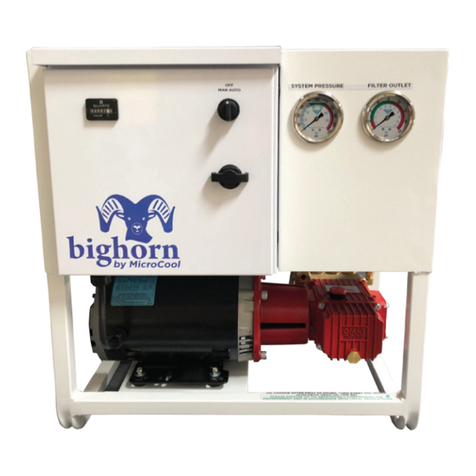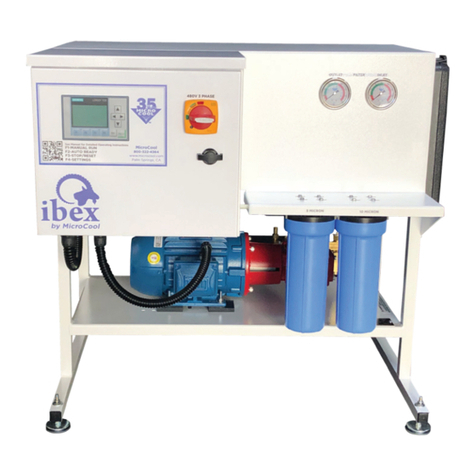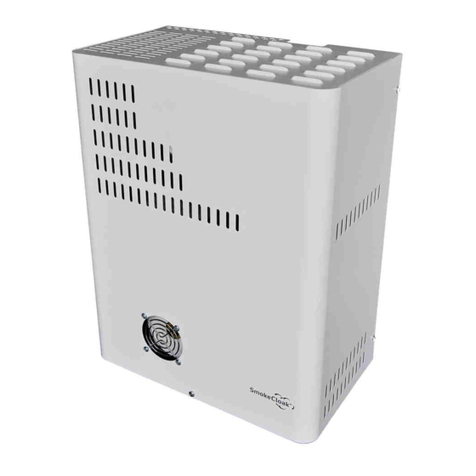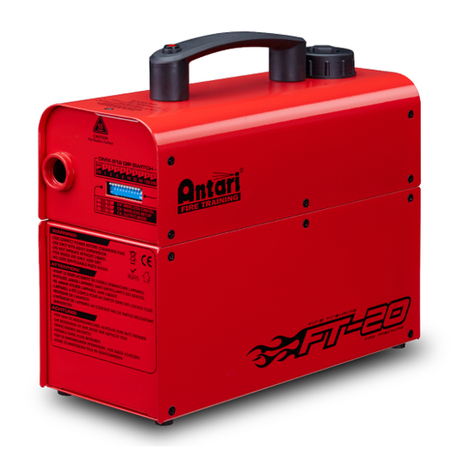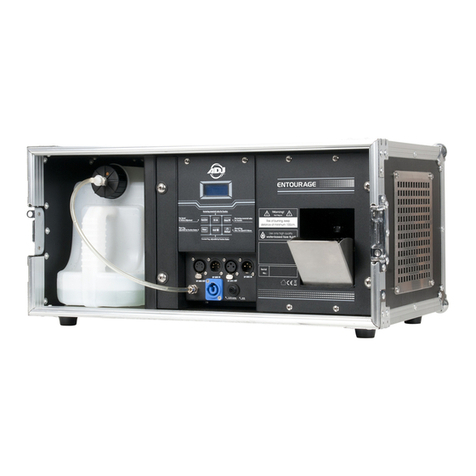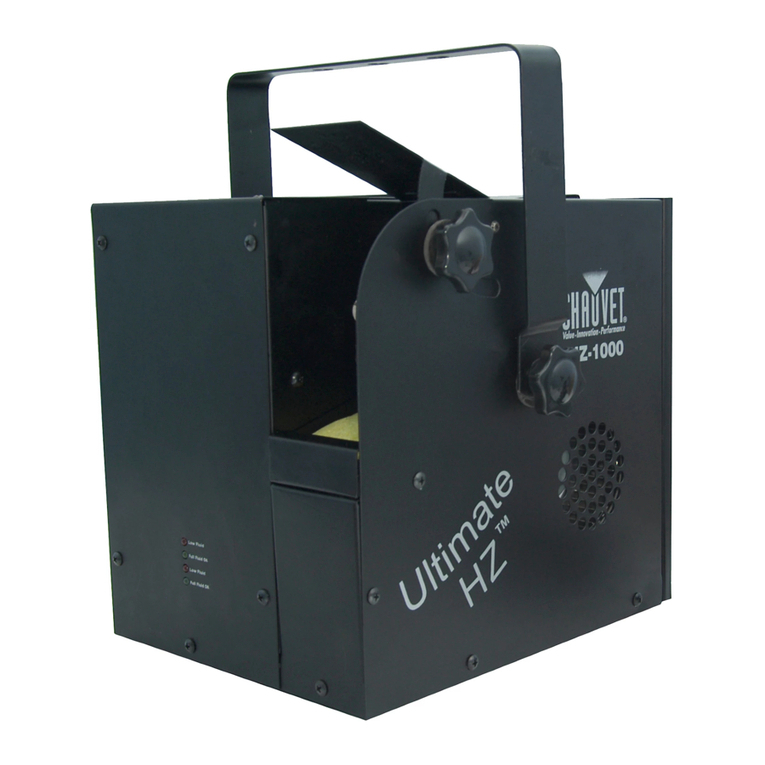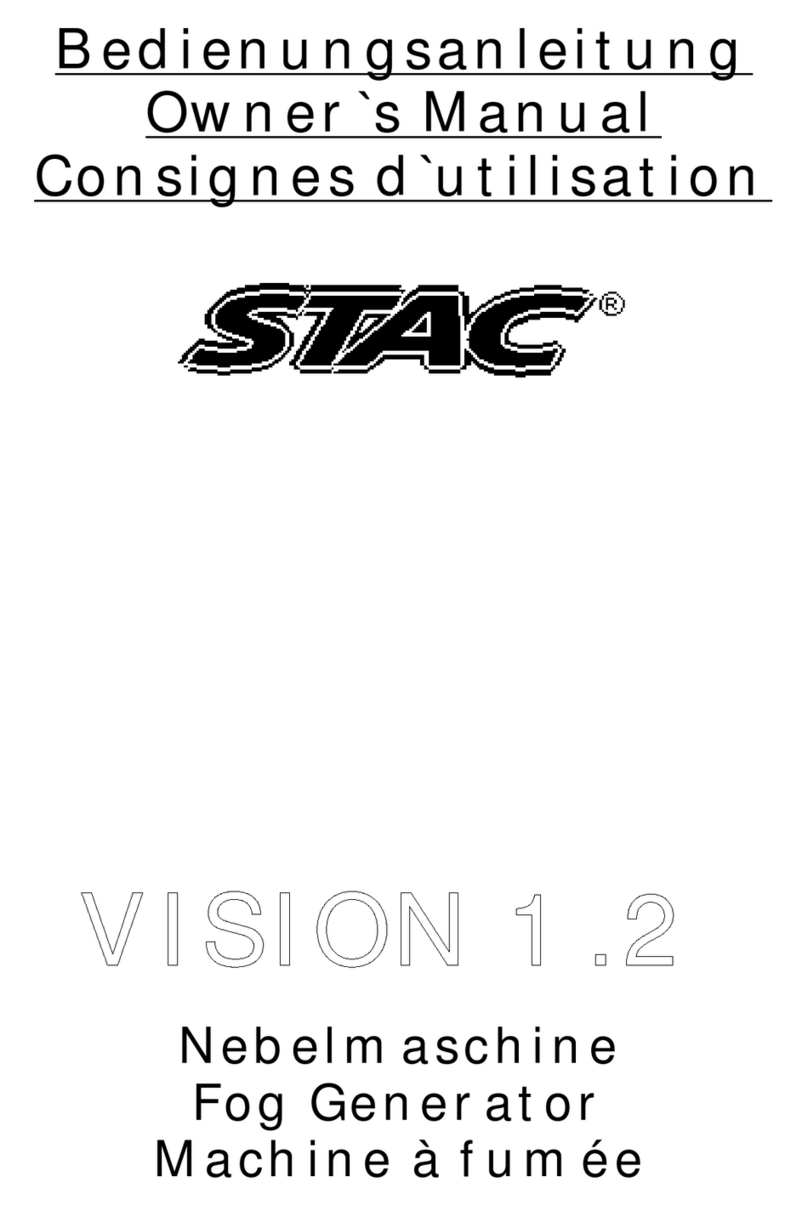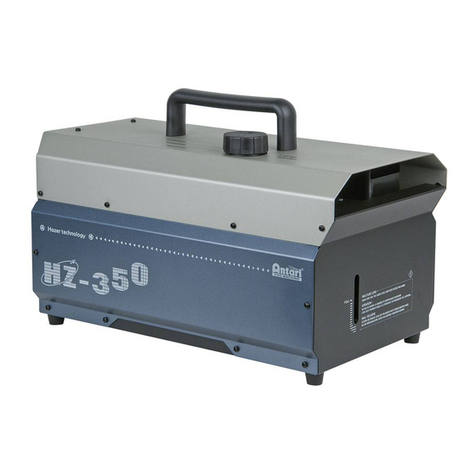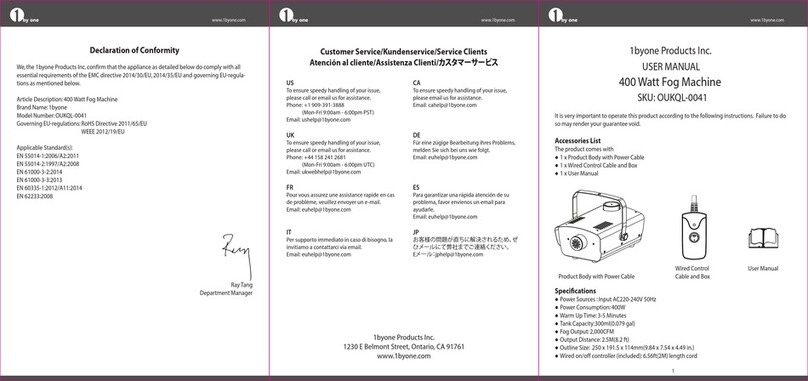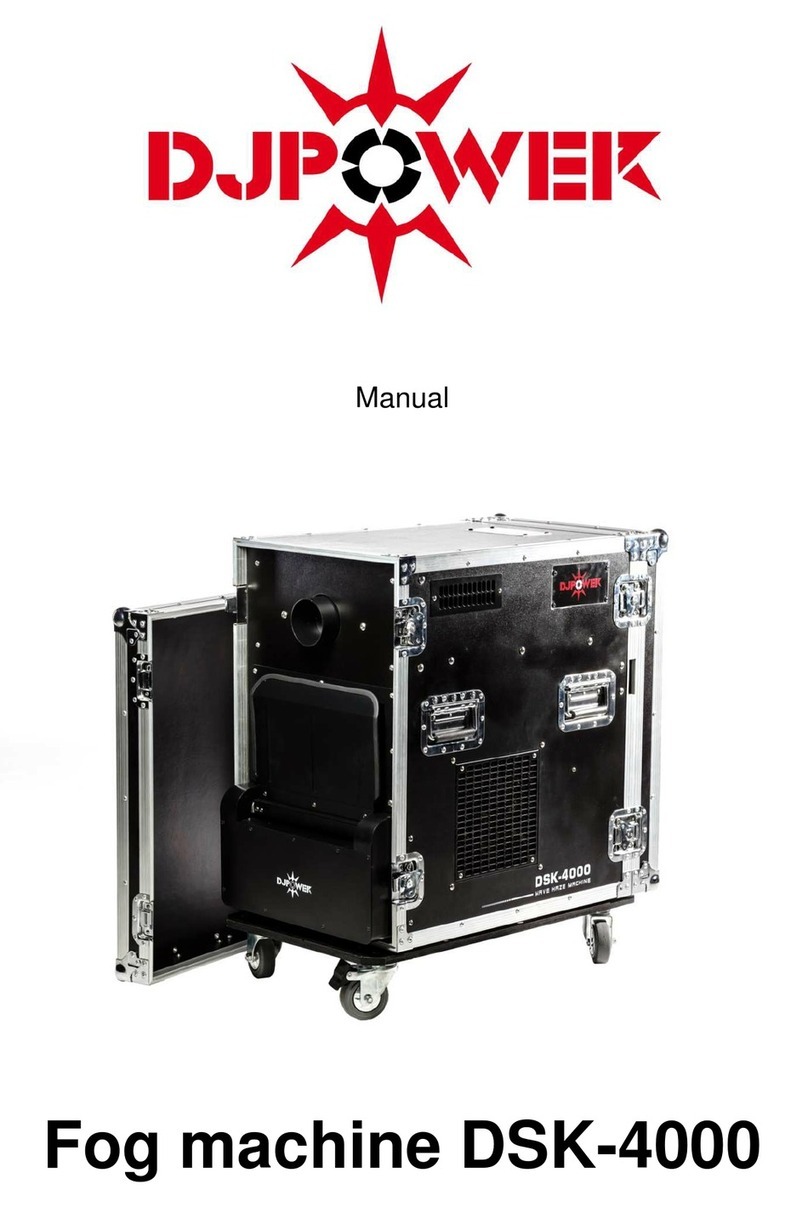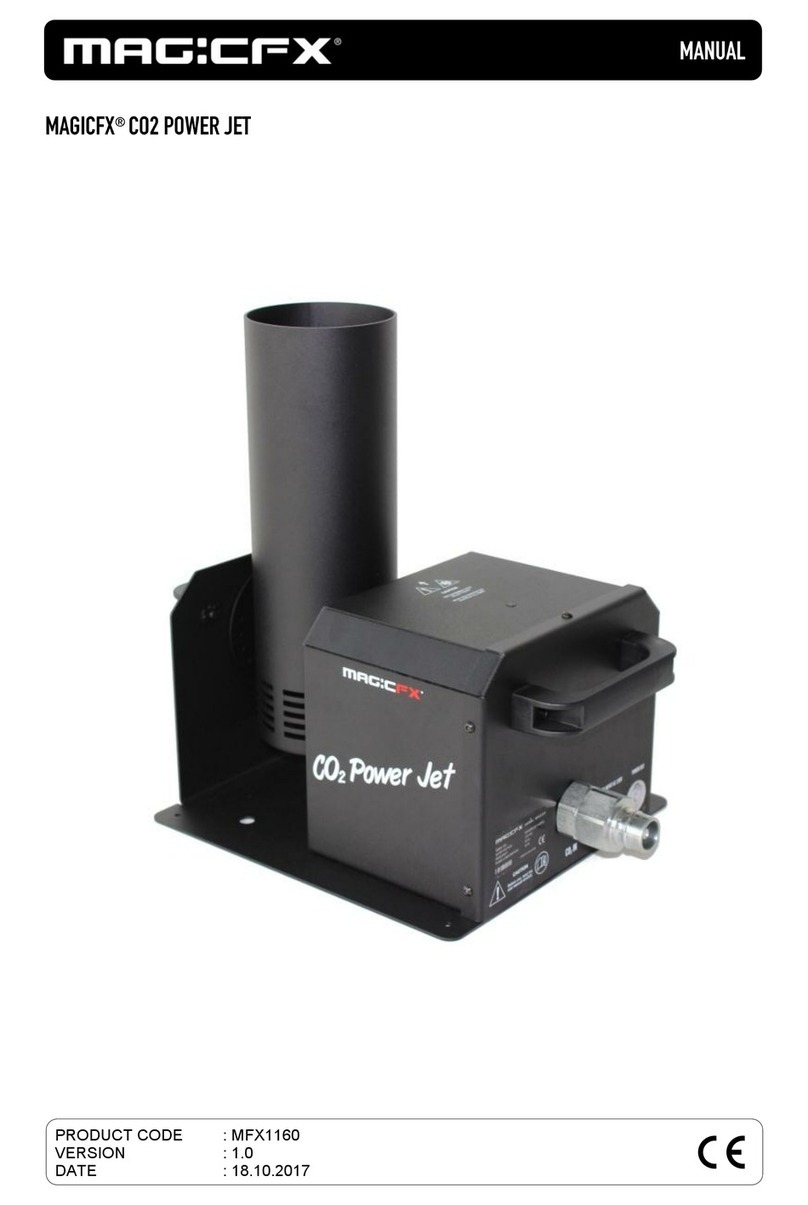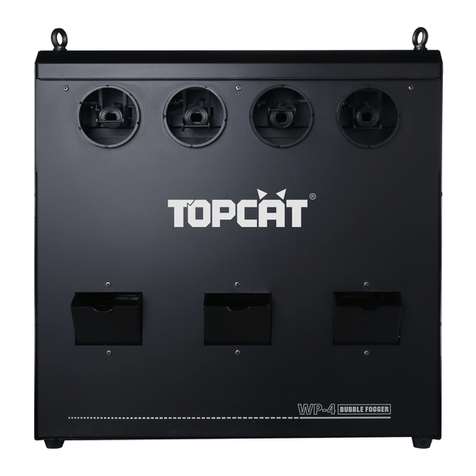MicroCool RHINO Series Instruction Manual

Master Rhino Manual_March 2020.docx March 20 Page 1 of 38
RHINO SERIES
2020 Installation & Maintenance Manual Version 03.20
MicroCool
72216 Northshore t. #103-104, Thousand Palms, CA 92276, USA

Master Rhino Manual_March 2020.docx March 20 Page 2 of 38
Web site www.microcool.com Email info@microcool.com
Phone: +1-760-322-1111 Fax: +1-760-343-1820
Table of Contents
1. BEFORE STARTING ..................................................................................................................... 5
1.1 CRANKCASE OIL PLUG ......................................................................................................................................................... 5
1.2 OIL LEVEL ............................................................................................................................................................................ 5
1.3 INLET WATER SUPPLY PRESSURE. ....................................................................................................................................... 5
1.4 OIL CHANGE INTERVAL ....................................................................................................................................................... 5
1.5 HIGH PRESSURE FITTINGS................................................................................................................................................... 5
1.6 INLET WATER SUPPLY PLUMBING MATERIAL ..................................................................................................................... 5
1.7 FLUSHING THE SYSTEM....................................................................................................................................................... 5
1.8 TEFLON TAPE ...................................................................................................................................................................... 5
2. WATER QUALITY........................................................................................................................ 6
2.1 TOTAL DISSOLVED SOLIDS COUNT ...................................................................................................................................... 6
2.2 WATER ANALYSIS ................................................................................................................................................................ 6
2.3 WATER TREATMENT ........................................................................................................................................................... 6
2.4 ULTRAVIOLET WATER PURIFIERS ........................................................................................................................................ 6
2.5 REVERSE OSMOSIS WATER TREATMENT ............................................................................................................................ 6
3. INSTALLATION OF THE PUMP MODULE ...................................................................................... 7
3.1 POSITIONING THE PUMP MODULE..................................................................................................................................... 7
3.2 WATER SUPPLY AND CONNECTION .................................................................................................................................... 7
3.3 DRAINAGE FROM THE PUMP.............................................................................................................................................. 7
4. PUMP MODULE POWER SUPPLY ................................................................................................ 7
4.1 CAUTION!............................................................................................................................................................................ 7
If the pump unit will be powerd by a generator at any time, a properly sized line reactor needs to be installed prior to the pump
unit to eliminate voltage spikes. If this is not done the Variable Frequency Drive (VFD) & processor could be damaged and
warranty may be void..................................................................................................................................................................... 7
4.2 INSURE ELECTRICAL SPECIFICATION ................................................................................................................................... 8
4.3 ELECTRICAL CONNECTIONS................................................................................................................................................. 8
4.4 ELECTRICAL CONNECTIONS/ HIGH VOLTAGE...................................................................................................................... 8
4.5 24V DC VOLTAGE FROM PUMP CONTROLLER .................................................................................................................... 9
5. STANDARD WIRING DIAGRAMS for MicroCool
RHINO pump modules....................................... 9
6. PRINCIPLE OF THE VFD system on the RHINO pump unit............................................................. 9

Master Rhino Manual_March 2020.docx March 20 Page 3 of 38
6.1 VARIABLE FREQUENCY DRIVE ............................................................................................................................................. 9
7. MicroCool RHINO - STARTING THE SYSTEM ................................................................................ 9
7.1 START UP ............................................................................................................................................................................ 9
8. PRESSURIZING THE SYSTEM ......................................................................................................10
8.1PRESSURIZING THE SYSTEM.............................................................................................................................................. 10
8.2 DO NOT ADJUST THE PRESSURE REGULATOR................................................................................................................... 10
If for any reason the regulator is adjusted, or changed, follow this procedure to reset the correct adjustment. ........................ 10
9. SYSTEM OPERATION .................................................................................................................11
9.1 TIME CLOCK ...................................................................................................................................................................... 12
9.2 DRAIN/PRESSURE RELIEF VALVE TIME.............................................................................................................................. 12
9.3 24 HOUR, 7 DAY CLOCK TIME ........................................................................................................................................... 12
9.4 CYCLE/PULSE TIMER.......................................................................................................................................................... 13
9.5 DISABLING F1 “MANUAL RUN”......................................................................................................................................... 13
9.6 SETTING INTERNAL TEMPERATURE AND HUMIDITY CONTROLS (OPTIONAL UPGRADE) ................................................. 14
9.7 SETTING FOR HUMIDITY CONTROL ONLY:: ....................................................................................................................... 14
9.8 SETTING FOR TEMPERATURE CONTROL ONLY:................................................................................................................. 14
9.9 SETTING FOR HUMIDITY CONTROL WITH TEMPERATURE OVERRIDE: ............................................................................. 14
9.10 SETTING FOR TEMPERATURE CONTROL WITH HUMIDITY OVERRIDE: ............................................................................. 14
10. SYSTEM MAINTENANCE ............................................................................................................20
10.1 CRANKCASE OIL................................................................................................................................................................. 20
SYNTHETIC 75w-90 GEAR OIL IS RECOMMENDED FOR ALL APPLICATIONS (Mobil One or Equal)................................................ 20
Figure 20 – Crankcase Oil Levels................................................................................................................................................... 20
10.2 ELECTRICAL MOTOR SERVICE............................................................................................................................................ 20
10.3 INLET WATER FILTERS ....................................................................................................................................................... 21
10.4 ATOMIZATION LINES/MANIFOLD HOSES.......................................................................................................................... 21
10.5 SYSTEM FLUSH – SHUT DOWN - WINTERIZING................................................................................................................. 21
10.6 INLET WATER PRESSURE SWITCH ..................................................................................................................................... 21
10.7 OPTIONAL EXTRAS ............................................................................................................................................................ 22
11. TROUBLE SHOOTING.................................................................................................................23
11.1 PUMP MODULE HAS STOPPED RUNNING......................................................................................................................... 23
11.2 INLET WATER PRESSURE FAULT:....................................................................................................................................... 23
11.3 VARIABLE FREQUENCY DRIVE (VFD) FAULT CODES .......................................................................................................... 23
12. WARRANTY ..............................................................................................................................25

Master Rhino Manual_March 2020.docx March 20 Page 4 of 38
13. UL CERTIFICATION ....................................................................................................................26
14. RHINO ILLUSTRATIONS .............................................................................................................27
14.1 RHINO FRONT VIEW……………………………………………………………………………………………………………………………………………………27
14.2 RHINO BACK VIEW ............................................................................................................................................................ 28
14.3 RHINO RIGHT SIDE VIEW................................................................................................................................................... 29
14.4 RHINO LEFT SIDE VIEW ..................................................................................................................................................... 30
14.5 RHINO PLAN VIEW ............................................................................................................................................................ 31
14.6 RHINO FILTER AND BRACKET ............................................................................................................................................ 32
14.7 CONTROL PANEL 1 ............................................................................................................................................................ 33
14.8 CONTROL PANEL 2 ............................................................................................................................................................ 34
14.9 CONTROL PANEL 3 ............................................................................................................................................................ 35
14.10 CONTROL PANEL 4 ........................................................................................................................................................ 36
14.11 RHINO SOLENOID.......................................................................................................................................................... 37
14.12 RHINO NOTES................................................................................................................................................................ 38

Master Rhino Manual_March 2020.docx March 20 Page 5 of 38
WARNING!!
PLEASE TAKE NOTE OF THE FOLLOWING
1. BEFORE STARTING
PLEASE READ THIS GUIDE ENTIRELY BEFORE BEGINNING INSTALLATION
ALSO, READ SUPPLEMENTAL INFORMATION RELATING TO OPTIONAL CONTROL EQUIPMENT
CRANKCASE OIL PLUG
The pump module crankcase vent has been plugged to prevent accidental oil leakage during shipment. Remove
the plug and replace with the supplied vent cap before operating pump unit. Failure to do so will cause oil leaks.
OIL LEVEL
Check that the oil level appears 1/2 way in the sight gauge or within range on the dipstick in the pump head.
INLET WATER SUPPLY PRESSURE.
When the pump module is running, it must be supplied with an inlet water supply of
NEVER LESS THAN 20 P.S.I. (1.40 BAR) AND NEVER MORE THAN 90 P.S.I. (6.20BAR)
•INLET WATER SUPPLY PRESSURE SHOULD BE STEADY AND SHOULD NOT BE ALLOWED TO FLUCTUATE OUTSIDE OF THESE
RANGES.FAILURE TO DO SO CAN RESULT IN DAMAGE TO EQUIPMENT AND IS NOT COVERED BY WARRANTY.
•IF WATER PRESSURE DROPS BELOW 20 PSI, THE PUMP WILL SHUT OFF AND THE FAULT LIGHT WILL COME ON. SEE SECTION
9SYSTEM OPERATION FOR FURTHER INFORMATION.
OIL CHANGE INTERVAL
The crankcase oil must be changed after the first 50 hours of operation and from then on, once every 500 hours.
•SYNTHETIC 75W-90 GEAR OIL IS RECOMMENDED FOR ALL APPLICATIONS (MOBILE ONE OR EQUAL)
•SECONDARY CHOICE SYNTHETIC 15W-50 MOTOR OIL MAY BE USED FOR ALL APPLICATIONS (MOBILE ONE OR EQUAL)
HIGH PRESSURE FITTINGS
The system operates at 1,000 P.S.I. (69 bar) and should always be shut down when working on fittings or manifold
line. When adjusting the orientation of the nozzles use only the correct tool and follow the procedures. Extreme
caution should always be exercised when working with high pressure water. Always wear safety glass when working
around fog equipment.
INLET WATER SUPPLY PLUMBING MATERIAL
Only rated and approved brass fittings or stainless steel fittings should be used to make plumbing connections. The
use of galvanized or steel pipe fittings can cause system failure, nozzle blockage and pump damage.
FLUSHING THE SYSTEM
Before pressurizing the system, flush all plumbing and atomization lines thoroughly to purge any residual debris.
Please refer to the startup section 7 of this manual.
TEFLON TAPE
When using Teflon tape on NPT threads, leave 1 or 2 of the starting threads showing. This will prevent pieces of
Teflon tape from entering the system, which could cause blockage or damage.

Master Rhino Manual_March 2020.docx March 20 Page 6 of 38
WATER QUALITY
2. WATER QUALITY
To obtain the best performance, special consideration should be given to the quality of water used in a MicroCool fog
system. For more information about Water Quality, consult a MicroCool specialist.
MicroCoolIS NOT RESPONSIBLE FOR NOZZLE BLOCKAGE DUE TO POOR WATER QUALITY.
TOTAL DISSOLVED SOLIDS COUNT
Water with total dissolved solids (TDS) counts of greater than 500 parts per million (PPM); water with high calcium
and magnesium carbonate levels, or water with pH levels below 6.7 and above 7.5 may not be satisfactory and could
lead to excessive nozzle blockage and nozzle maintenance.
WATER ANALYSIS
If there is any doubt about water quality, a water analysis is recommended. Of major interest is the water’s Langelier
Saturation Index (SLI) together with other items such as hardness and TDS. A slightly negative, or neutral, Langelier
index is preferred, whereas a positive index may indicate a tendency to form calcium carbonate deposits in the lines
and nozzles.If using city water, an analysis should be available from the city/town water department. If in any doubt,
please contact your MicroCool representative for further information.
WATER TREATMENT
Generally speaking, most municipal water is suitable for atomization. Well water, river water and the like should be
tested before atomizing. If an analysis indicates any unusually high levels of undesirables’ proper treatments are
available. MicroCoolcan supply a variety of water treatment systems. Please contact MicroCoolfor further
details.
ULTRAVIOLET WATER PURIFIERS
Optional ULTRAVIOLET high intensity light purifiers can also be installed on the inlet water supply to sterilize the
system water. By bombarding the water with UV light, dangerous pathogens, spores and germs are destroyed. UV
systems must be regularly serviced to maintain the correct high intensity output.
REVERSE OSMOSIS WATER TREATMENT
MicroCool offers optional comprehensive reverse osmosis packages for all applications. Units are available for large
scale industrial as well as domestic installations.
Reverse Osmosis units incorporate a semi-permeable membrane that micro filters the water to 0.0001 microns
removing bacteria, viruses, aqueous salts and metal ions. By eliminating these from the supply water, MicroCool
ensures that clean, hygienic water is used in each system. Clean water will also reduce nozzle blockage, foul odors
and white “chalky” deposits on material close to the fog spray.
MicroCool reverse osmosis systems are designed specifically for each application – please consult with MicroCool
specialists for more details.

Master Rhino Manual_March 2020.docx March 20 Page 7 of 38
3. INSTALLATION OF THE PUMP MODULE
Installation Procedure:
•Determine pump module location
•Identify water supply/connection for the system
•Determine routing of the high pressure manifold from the pump.
•Establish drainage location from the pump.
•Verify correct electrical power supply to the pump.
•Determine all of the above for optional Equipment - Zone Controllers, Temperature/Humidity Controllers, Reverse
Osmosis, UV sterilizers, etc...
POSITIONING THE PUMP MODULE
The pump module requires a flat level surface. Position selection will largely depend on the availability of power and
water, but remember the points outlined on the previous pages as the terms of the pump warranty depend upon it.
A concrete floor or a concrete slab is ideal. Attach the supplied adjustable feet and plugs to the legs of the pump as
shown in the photograph (right). Using a level, make sure that the RHINO unit sits as level and plumb as possible.
WATER SUPPLY AND CONNECTION
The water supply should be capable of 1.5 times the maximum flow of the pump as shown in the table below.
Pump Model & Flow
MIN Flow rate
(USGPM)
MIN Flow Rate (LPM)
MIN Pressure psi /
bars
RHINO 15 (56.8L)
22.5
85
20 / 1.40
RHINO 20 (75.8L)
30.0
114
20 / 1.40
RHINO 25 (94.6L)
37.5
142
20 / 1.40
Correct water pressure and flow rate are essential to pump operation. All pump modules require a minimum of 20
P.S.I. (1.40 BAR) and a maximum of 90 P.S.I. (6.20 BAR) while in operation. The pressure should always be constant
and not fluctuate outside these ranges, especially on system start up. All pump modules are equipped with an inlet
water fault delay timer, which allows small drops in pressure, but will ultimately “fault off” if low pressure is present
for more than a few seconds.
Ensure that either copper or PVC pipe is used to provide the correct water supply to the RHINO unit. Never use steel
or galvanized steel fittings. Always use the largest diameter pipe practical.
DRAINAGE FROM THE PUMP
After the pump module shuts down, the water remaining in the manifold lines will drain out through the pump module
and the end of the atomization lines on some lines. Ensure that the drain outlet is routed to a suitable drainage point
to avoid flooding.A 6 foot (1.8 M) low pressure drain hose is provided for this purpose. This hose can be extended
as necessary.
4. PUMP MODULE POWER SUPPLY
After all water and plumbing connections have been completed, a licensed, qualified electrician should connect the power
supply to the pump. It is important to follow the National Electrical Code (NEC), as well as any local codes to ensure a
safe installation.
CAUTION!
If the pump unit will be powerd by a generator at any time, a properly sized line reactor needs to be
installed prior to the pump unit to eliminate voltage spikes. If this is not done the Variable Frequency Drive
(VFD) & processor could be damaged and warranty may be void.

Master Rhino Manual_March 2020.docx March 20 Page 8 of 38
INSURE ELECTRICAL SPECIFICATION
Establish that the circuit to be used to power the pump module is of the same electrical specification as the pump
module. The RHINO electrical specification can be found on the serial number label or from the electrical wiring
diagram adhered to the inside cover of the electrical enclosure on the pump module.
4.2.1 The circuit to the pump module must be dedicated and properly sized to carry the electrical load placed upon
it by the pump motor. Please refer to the MicroCoolEngineering Manual or electrical data plate on the
motor to determine the amperage draw of the RHINO pump module.
4.2.2 The power supply to the pump module must be hard wired directly to a fused disconnect box. If the power
supply cannot be directly wired to a disconnect box, then it should be hard wired using a junction box into a
suitable circuit with a disconnect box located elsewhere. This applies to either single phase or three phase
applications.
4.2.3 After verifying all of the above, power should be taken from the disconnect box/junction box to the terminal
strip located inside the electrical enclosure. We recommended that the correct sized wiring be in conduit
(preferably liquid tight); make the final connection to the high voltage terminal strip.
ELECTRICAL CONNECTIONS
Wiring between the control panel and the pump unit is detailed in the supplied electrical diagram on page 43. We
recommend that a LICENSED ELECTRICIAN IS USED FOR ELECTRICAL CONNECTIONS.
ELECTRICAL CONNECTIONS/ HIGH VOLTAGE
Open front cover to connect the high voltage wiring to pump controls. Connect high voltage to TB1(terminal block
1) electrical strip in the control box. There is a conduit connector provided for connecting conduit to the side of the
control box.
208-240 volt 3 phase 50/60 Hz systems connect to:
Connections:
1: Zero Voltage Remote Start (cable must be shielded)
2: Zero Voltage Remote Start (cable must be shielded)
3: Zero Voltage Fault output
4: Zero Voltage Fault output
5: 208-240 Volt 3 phase 50/60 Hz power supply- L1
6: 208-240 Volt 3 phase 50/60 Hz power supply- L2
7: 208-240 Volt 3 phase 50/60 Hz power supply- L3
Ground grnd(grn/yel)
See note 4.5
380-575 volt 3 phase systems connect to:
PD1 - Connections:
L1: 380-575 Volt 3 phase 50/60 Hz power supply- L1
L2: 380-575 Volt 3 phase 50/60 Hz power supply- L2
L3: 380-575 Volt 3 phase 50/60 Hz power supply- L3
TB1 - Connections:
1: Zero Voltage Remote Start (cable must be shielded)
2: Zero Voltage Remote Start (cable must be shielded)
3: Zero Voltage Fault output
4: Zero Voltage Fault output
Ground grnd(grn/yel)

Master Rhino Manual_March 2020.docx March 20 Page 9 of 38
24V DC VOLTAGE FROM PUMP CONTROLLER
External (remote) start connections must be made to TB1 Terminals 1 & 2. Note that this connection is powered by
a 24V DC voltage from the pump controller. Adequate care must be taken NOT to connect a different or separate
power supply to these terminals as serious damage could occur. If in doubt – please contact the factory for a
suitable relay or conditioner.
WARNING: The control box is completely wired for immediate operation. After high voltage wiring is connected
and the unit is supplied with proper water pressure, pressing F1 will immediately activate the pump operation.
5. STANDARD WIRING DIAGRAMS for MicroCoolRHINO pump modules
An as-built wiring diagram has been added to the back of this manual (see page 43).
6. PRINCIPLE OF THE VFD system on the RHINO pump unit
VARIABLE FREQUENCY DRIVE
6.1.1 A VFD (Variable Frequency Drive) controls the speed of the electrical motor (and subsequently the pump
head) by changing the Frequency (Hertz). The RHINO pump module has a Pressure Transducer unit
mounted on the high-pressure (discharge) side of the pump that transmits the water pressure back to the
control unit.
6.1.2 The controller is pre-set to maintain a pressure of 1,000 psi (69 Bar) at the discharge of the pump.
6.1.3 As the water flow rate of the system changes (for example with more or less nozzles in operation) the
controller will increase or decrease the motor speed to maintain the required pressure (1,000 psi / 69 Bar).
The controller is capable of increasing the speed (frequency) to a maximum of 50 Hz. The rate of change is
governed by programming within the drive to reduce motor, pump, and equipment wear.
6.1.4 The minimum speed of the motor is also regulated by the controller. At very low rpm, the pump may be
moving too slowly to adequately distribute the oil in the pump reservoir. Damage to the pump may occur.
The minimum speed (frequency) is set at 20 Hz to protect the pump unit from oil starvation.
6.1.5 For more details on the VFD drive, the readings and fault status, refer to the WEG Drive supplement at the
end of this manual.
7. MicroCool RHINO - STARTING THE SYSTEM
START UP
7.1.1 Install UV bulb prior to start up. (If installed)
7.1.2 The system must be primed and flushed before pressurization. This removes any contaminants such as dirt,
brass filings or Teflon tape that have found their way into the system.
7.1.3 Turn on the water supply to the pump module. The inlet or low pressure gauge should read at the very least
20 PSI (1.4 BAR) indicated by the green area of the dial. If the water pressure is not sufficient, do not try to
start the pump. The water pressure problem must be corrected first.
7.1.4 To prime the pump module turn on the power supply to the RHINO module, open the electrical enclosure,
switch the circuit breaker to the on position. Once the VFD indicates “RDY” and the PLC is illuminated,
press F3 and F4 simultaneously, this will start the prime sequence of 30 seconds. The pump is now ready to
be started.

Master Rhino Manual_March 2020.docx March 20 Page 10 of 38
7.1.5 To start the RHINO module press F1 (run in Manual). The pump module will now run, there must be
between 20 PSI (1.4 BAR) and 90 PSI (6.2 BAR) of pressure available to the pump at all times. Note-
should the water pressure drop below the factory preset of 20 PSI, there is a 3 second delay before the
system goes to “FAULT”. Refer to section 9 to reset.
7.1.6 The pump motor RPM will ramp (increase) up to the maximum speed (50 Hz) to fill the system. Do not worry
if the pressure does NOT reach 1,000 PSI (69 BAR) at this time (during flush sequence).
7.1.7 Let the module run for 2-3 minutes making sure that there is a good flow of water running out the end of the
atomization lines. Lines may have to be flushed in groups with larger system to ensure adequate system
flush.
7.1.8 When finished, press F3 (Stop) to stop the pump module.
7.1.9 The system is now flushed and ready for the pressurization procedure.
8. PRESSURIZING THE SYSTEM
PRESSURIZING THE SYSTEM
8.1.1 Safety glasses must be worn when adjusting pressure. Always keep guards and covers in place.
8.1.2 Install the plugs or automatic drain valves into the ends of the atomization lines. Use Teflon tape on all NPT
threads and tighten each fitting firmly. Do not apply tape to compression fittings or ball seat fittings (Female
swivel hose fitting).
8.1.3 Press F1 to start the pump. The RHINO pump will run at full speed until 1100 PSI (regulator setting) is
achieved. The pump will then slow down and maintain 1000 PSI.
DO NOT ADJUST THE PRESSURE REGULATOR
The regulator is set as a safety valve should the system pressure exceed 1,100 psi or 75.8 Bar. At extremely low
flow, the regulator will bypass water back into the pump head as the VFD drive has reached its minimum Frequency
(Hertz) as mentioned in the above section.NEVER DISASSEMBLE THE REGULATOR UNDER PRESSURE!
If for any reason the regulator is adjusted, or changed, follow this procedure to reset the correct adjustment.
8.2.1 Turn off the electrical supply at the disconnect switch to electrically isolate the pump.
8.2.2 Locate the pressure transducer and unplug the electrical lead.
8.2.3 Restore the power and start the unit by pressing F1.
8.2.4 Adjust the regulator by turning clockwise or counter-clockwise until the pressure gauge indicates
1,100 psi (75.8 Bar). When the pressure is steady at 1,100 make sure that the “Jam Nut” is tightened
to lock the adjustment in position.
8.2.5 Press F3 to turn off the pump, disconnect the electrical supply.
8.2.6 Plug electrical lead back into transducer, restore electrical power.

Master Rhino Manual_March 2020.docx March 20 Page 11 of 38
9. SYSTEM OPERATION
9.1 FUNCTION KEYS
F1 – Manual Run
F2 – Auto Ready
F3 – Stop/Reset
F4 – Use to access parameter settings (hold for 3 seconds)
ESC – Exit existing screen
OK – Enter/Save
F1 – MANUAL RUN
F1 operates the pump manually, the pump will run continuously regardless of external controllers or internal
time settings. F1 should be disabled if the system design requires the pump to be operated by zone
controllers, external controllers or internal time clocks. See 9.6 Disabling F1 “Manual Run”
F2 – AUTO READY
F2 puts the pump in automatic mode and requires a hard-wired input (switch) into the electrical control
panel on terminal 1 & 2 on TB1 (yellow and blue terminal blocks). Auto mode is also used if the internal 24
hour, 7 day clocks and/or internal temperature and humidity controllers are to be activated.
Note: If the internal controls are to be used and no remote switch is installed, then the supplied jumper is to
be installed between terminal 1 & 2 on TB1.
F3 – STOP/RESET
F3 is the stop and reset input. This button will stop the pump module and reset all faults.
F4 – PARAMETERS, SETTINGS & PUMP DETAILS
HoldING F4 in for 3 seconds will bring up the pump details which include: Model number, Serial number,
Manufacture date and PLC Program version. This screen will stay visible for 30 seconds. The parameter
settings are also accessible from this screen. See 9.1 and 9.2

Master Rhino Manual_March 2020.docx March 20 Page 12 of 38
TIME CLOCK
The internal time clock needs to be set to the correct local time.
9.1.1 SETTING DATE & TIME
1. Press and hold F4 for three seconds.
2. Display screen will change to day, time and date.
3. Press “ESC” once.
4. Display screen will indicate “Stop”, “Program”, “Setup”, “Diagnostics” and “Network” with “>” indicating
selection.
5. Use the ▲&▼buttons to move the >selection indicator to “>Setup” and press OK.
6. Use the ▲&▼buttons to move the >selection indicator to “>Clock.” and press OK.
7. Use the ► & ◄ buttons to move the cursor and the ▲&▼buttons to change the value.
8. Once the value is changed move the cursor to the next value.
9. Set the date and time and press OK to save.
10. Press “ESC” to exit the current menu.
11. To exit the menus completely, press the “ESC” until day, time and date is displayed and press the ▲button.
12. The display will return to the home screen
9.1.2 SETTING AUXILIARY PARAMETERS
1. Auxiliary features only operate in “Auto” (F2)
2. The RHINO pump system has internal features that can be activated if required. The features consist of a
drain valve timer, three, 24 hour, 7 day clock timers, cycle/pulse timer, temperature and humidity control
(optional upgrade)
3. To access and activate these features follow the steps bellow:
4. Press and hold F4 for three seconds.
5. Display screen will change to day, time and date.
6. Press “ESC” once.
7. Display screen will indicate “Stop”, “Set Param”, Msg Config” and “Set..” with “>” indicating selection.
8. Use the ▲&▼buttons to move the >selection indicator to “>Set Program” and press OK.
9. Use the ▲&▼buttons to move the >selection indicator to “>Set Parameters” and press OK.
10. Using the ▲&▼buttons to move through the menu until you get to required option and press OK.
11. Use the ► & ◄ buttons to move the cursor and the ▲&▼buttons to change the value.
12. Once the value is changed move the cursor to the next value.
13. To save the changes press the “OK” button once.
DRAIN/PRESSURE RELIEF VALVE TIME
The drain/pressure relief valve time is the time setting that determines how long the drain valve remains open after
pump unit shuts down. This valve can be used to only relive the nozzle line pressure or relieve the nozzle line
pressure and drain the system. If only pressure relief is required then a short time of 10 – 15 seconds is adequate, if
the system is required to drain completely then a longer time setting would be required, depending on the system
size and length of manifold lines.
9.2.1 SETTING DRAIN VALVE TIME
1. The following feature is available in “Set Param” and is labeled as “DRAIN T” the default drain time
setting is 30 seconds.
2. To access and increase or decrease the drain time, follow the steps in 9.2 "Setting Auxiliary
Parameters”
24 HOUR, 7 DAY CLOCK TIME
The controller contains three 24 hour 7 day time clocks that can be set to start and stop the pump unit on pre-set
days and times as required. Special care should be taken so as not to not program conflicting times.

Master Rhino Manual_March 2020.docx March 20 Page 13 of 38
9.3.1 SETTING 24 HOUR, 7 DAY CLOCK TIMERS
1. The following feature is available in “Set Param” and is labeled as “WEEK T 1”, “WEEK T 2”, “WEEK T
3”. The default setting is “OFF”.
2. Again, special care should be taken when programing this feature to avoid conflicting times between
the three different timers.
3. To access and set the timer, or timers, follow the steps in 9.2 "Setting Auxiliary Parameters”
4. To enable the 7 day 24 hour timer feature, the “CLOCK TMR” “Switch=off” needs to be set to
“Switch=on.”
5. Set the days of week, the “ON” (start) time and the “OFF” (stop) TIME.
6. The pump system will only operate within the set times in “Auto”
Note: If there is no remote switch required in the system, the supplied jumper needs to be installed between
terminal 1 & 2 on TB1 (Yellow & Blue terminal block)
CYCLE/PULSE TIMER
The cycle/pulse timer will cycle the pump on and off based on the time settings in the timer, TH represents on time
and TL represents the off time.
9.4.1 SETTING CYCLE/PULSE TIMER
1. The following feature is available in “Set Param” and is labeled as “CYCLE T” the default setting is 1
minute on and 1 minute off but is disabled.
2. To access, enable and set cycle/pulse times, follow the steps in 9.2 "Setting Auxiliary Parameters”
3. To enable the cycle timer feature the “CYCLE” “Switch=off” needs to be set to “Switch=on.
4. “CYCLE T” settings are represented as “TH” as on time and “TL” as off time.
5. The cycle/pulse feature will cycle/pulse the pump module while operating in “Auto”
CAUTION-do not set the off cycle time shorter than 1 minute in order to avoid motor overheating.
DISABLING F1 “MANUAL RUN”
If the system includes zone controllers or zone valves, and is run in Auto, F1 should be disabled. By
disabling F1, the pump system has to be started and stopped by a remote input from a zone controller, or
another control device, and the pump would be in “Auto Ready” (press F2).
WARNING, operating the pump unit in F1 “Manual Run” with zone controllers or zone valves installed in the system,
could cause the pump to dead-head resulting in damage to the pump unit that would not be covered under
warranty.
1. F1 disable is located in “Set Param” and is labeled as “F1 DISAB” the default setting is off. The soft key
settings represent:
a. Off = F1 is enabled
b. On = F1 is disabled
2. To access, enable and set F1 operation, follow the steps in 9.2 “Setting Axillary Parameters”

Master Rhino Manual_March 2020.docx March 20 Page 14 of 38
SETTING INTERNAL TEMPERATURE AND HUMIDITY CONTROLS (OPTIONAL UPGRADE)
1. If this upgrade was ordered with the system, temperature and humidity control will be available in
the controller.
2. To access, enable and set the temperature and humidity control. Follow the steps in "Setting
Auxiliary Parameters”
3. To enable the temperature and humidity control, “TEMP & HUM” switch needs to be set from
“Switch=off” to “Switch=on”.
4. “HUMID SP” represents the humidity set point. To enter the set point, set the “off=**” to required
humidity level and set “on=**” to 0%. Example: if required humidity set point is 35%, set “off= 35”
and “on= 0”.
5. “TEMP SP” represents temperature set point, to enter the set point, set the “off=**” to required
temperature level in F°/C° and set “on=**” to at least 3° points above “off=**” setting. The difference
between the on and off setting is the hysteresis or dead band. Example: if required temperature set
point is 75°F with a 3°F dead band set “off=75” and “on=78”.
6. The temperature and humidity outputs are in series, so both the temperature and humidity contacts
needs to be closed for the system to run.
7. To view current temperature and humidity levels and set points, press “F4” once. The display will
revert back to the operation screen after 30 seconds.
SETTING FOR HUMIDITY CONTROL ONLY::
1. Set the temperature set point to 33°F/0°C “off=33°F/1°C” and “on=34°F/1°C”. (This forces the temp
contact.)
2. Set the humidity set point to desired humidity to be maintained as described above.
3. The controller will start the pump system when the humidity drops below the set point.
SETTING FOR TEMPERATURE CONTROL ONLY:
1. Set the humidity set point to 100%. (This forces the humidity contact).
2. Set the temperature set point to the desired temperature to be maintained as described above.
3. The controller will start the pump system when the Temperature drops below the set point.
SETTING FOR HUMIDITY CONTROL WITH TEMPERATURE OVERRIDE:
1. Set the humidity set point to desired humidity to be controlled as described above.
2. Set the temperature set point to desired temperature, not to go below as described above.
3. The controller will start the pump system when the humidity drops below the humidity set point, but
will stop the pump if the temperature drops below temperature set point.
SETTING FOR TEMPERATURE CONTROL WITH HUMIDITY OVERRIDE:
Set the temperature set point to desired temperature as described above.
Set the humidity set point to humidity level not to exceed as described above.
The controller will start the pump system when the temperature rises above the set point, but will shut the
pump system off when the humidity set point is reached.

Master Rhino Manual_March 2020.docx March 20 Page 15 of 38
MicroCool® RHINO Pump Information Screens
Home Screen
•MicroCool Pump
•Software version
•Hours of operation
Keypad Functions
•F1- Press to run manual
•F2- Press to run in auto (requires external
contact)
•F3- Stop/ Reset
•F4- Hold for 3 seconds to enter parameter
settings
Data Plate
•Press and hold F4 for 3 seconds. The pump
detail display will remain visible for 30
seconds.
•Model number.
•Serial number.
•Manufacture date.
•PLC software version.
Manual Run
•Pump is running “RUN” Manual
•System pressure
•Hours of operation
Auto Ready
•Pump is “Auto Ready” to run (requires external
contact to run)
•System pressure
•Hours of operation

Master Rhino Manual_March 2020.docx March 20 Page 16 of 38
Auto Run
•Pump is in “Auto Run”
•System Pressure
•Hours of Operation
One Shot Run
•Pump is running in “Auto” mode.
•One shot timer is active and counting down.
•System pressure.
•Hours of operation
Control Parameters
•Current temperature
•Temperature set point
•Current humidity
•Humidity set point
*Only active when temp and humid soft key is set
to ON in “parameter set”
(only available with optional upgrade)
Auto Run Control Parameters
•Pump is running in AUTO
•System pressure
•Current humidity
•Current temperature
*Only active once temp and humid soft key is set
to ON in “parameter set”
(only available with optional upgrade)
Prime/Flush
•Pump system is in Prime or Flush sequence
•Prime/Flush Time
•Elapsed Time

Master Rhino Manual_March 2020.docx March 20 Page 17 of 38
Auto Clock Run
•Pump is running “RUN” in auto time clock
•System pressure
•Hours of operation
Pressure Relief
•Pump has stopped and is draining
•System pressure
•Drain Time
Auto Cycle Run
•Pump is running on cycle time
•On timer
•System pressure
•Hours of Operation
Auto Start Delay
•Auto Start Active
•Start Delay
•Delay Time
•Hours of Operation

Master Rhino Manual_March 2020.docx March 20 Page 18 of 38
Inlet Pressure Fault
•Inlet water pressure dropped below safe
operating limit
•30 second restart delay is in process
•If water pressure is restored within 30 second
delay, pump will start up and operate normally
•If water pressure is not restored, another 30
second delay will start
•Pump will attempt to restart 4 times before the
system locks out on a fault
Frequency Inverter Fault
•Pump system has faulted on VFD fault
•30 second restart delay is in process.
•If VFD fault is cleared within 30 seconds pump
will restart and operate normally.
•The pump will attempt to restart 4 times before
the system locks out on a fault.
Service Oil Change
•Pump requires service.
•Change pump oil – (Please dispose of used
oil in accordance with local laws and
regulation).
•Press F4 key 3 times consecutively to reset
Manual Disabled
•F1 button disabled
•Settings to enable
Service UV Lamp
•Change UV lamp
•Press F4 three times to rest.

Master Rhino Manual_March 2020.docx March 20 Page 19 of 38
Lockout Fault- Inlet Pressure
•Pump system has faulted out on a low water
pressure fault.
•Restore water pressure to the pump.
•Press F3 to reset
Lockout Fault – High Water Temp.
**Upgrade on RHINO.
•Pump system has faulted on high water
temperature fault.
•This fault is typically caused by dead heading
the pump by running it in “Manual” with zone
valves closed, see point 9.6.
•Check that all zone valves are operating
correctly and are in “Auto”
•Press F3 to reset, if fault does not clear
activate the prime and flush sequence by
pressing F3 and F4 simultaneously. This will
flush the pump system with cool supply water.
Once it is complete Press F3 to clear fault. If
the fault does not clear, repeat the flush
process.
•Note: The fault will only clear once the
temperature of the system has dropped below
101°F/38°C.
Lockout Fault – Frequency Inverter
•Pump system has faulted on VFD fault
•Reference manual with fault code on VFD
•Once cleared press F3 to reset
Lockout Fault - High Outlet Pressure
•Pump system faulted on high outlet pressure
•Check regulator settings
•Press F3 to reset

Master Rhino Manual_March 2020.docx March 20 Page 20 of 38
10. SYSTEM MAINTENANCE
CRANKCASE OIL
The RHINO pump unit is equipped with an hour meter and an automatic
reminder to change pump oil; Red light, slow flash (does not affect
operation). See page 10 for instructions to reset light indicator.
Initially the Crankcase Oil must be changed after the first 50 operating
hours.
After that it should be changed after every 500 hours of operation.
Examples of 500 hours operation:
15 weeks of 5 hour operation per day
9 weeks of 8 hour operation per day
6 weeks of 12 hour operation per day
3 weeks of 24 hour operation per day
Chart to the right indicates oil capacity for each pump
SYNTHETIC 75w-90 GEAR OIL IS RECOMMENDED FOR ALL APPLICATIONS (Mobil One or Equal)
In the event that 75w-90 is not available, synthetic 15w-50 Motor oil may be substituted (Mobil One or
Equal)
Figure 20 – Crankcase Oil Levels
ELECTRICAL MOTOR SERVICE
Two types of electrical motors are used on the MicroCoolpump modules. Some small motors have sealed
rotor bearings and some require lubrication periodically. Refer to the motor nameplate for the type of motor. If
the motor is equipped with external grease nipples refer to the chart below for lubrication instructions.
Service Condition
Time Intervals
Standard
Every 3 Years
Severe
Every 1 Year
Seasonal
Lubricate at beginning of season
Electrical motors on the pump modules are pre-greased with a polyurea mineral oil NGLI grade 2-type grease
unless stated otherwise on the motor nameplate. Some compatible brands of polyurea mineral base type grease
are: Chevron SRI #2, Rykon Premium #2, Shell Oil Doilum R or Texaco Polystar RB. Motors are properly
lubricated at the time of manufacture and do not need to be lubricated at the time of installation.
NOTE: Over greasing bearings can cause premature bearing and/or motor failure. The amount of grease added
to the motor should be carefully controlled. One crank of the grease gun handle is usually sufficient.
Crankcase Oil Capacity
Giant P420A
30 fl oz.
Giant P470
30 fl oz.
Giant P536
68 fl oz.
FILL TO CENTER
OF SIGHT GLASSOIL DRAIN
OIL FILL AND DIPSTICK
P400-P500 Giant Pump
This manual suits for next models
3
Table of contents
Other MicroCool Fog Machine manuals
